Greek Civ Test
1/61
There's no tags or description
Looks like no tags are added yet.
Name | Mastery | Learn | Test | Matching | Spaced | Call with Kai |
|---|
No analytics yet
Send a link to your students to track their progress
62 Terms
Book 1 (Fight between Achilles and Menelaus)
Summary: The Greeks are sent a plague after stealing a Priest of Apollo’s daughter. Achilles, the greatest Greek warrior, is enraged when Agamemnon, leader of the Greek forces, takes his war prize, Briseis, in exchange for fixing the priest problem. In anger, Achilles withdraws from the fighting and refuses to fight for the Greeks, which leads to their struggles. Achilles prays to his mother, Thetis, to ask Zeus to help the Trojans to punish the Greeks for dishonoring him. She does, and the daughter of Apollo’s priest is returned and the plague is lifted.
Important Characters: Achilles, Agamemnon, Briseis, Thetis, Zeus, Calchas, Nestor.
Book 2 (False dream and catalogue of ships)
Summary: Zeus sends a dream to Agamemnon, convincing him that the Greeks will win if they fight. Agamemnon tests the soldiers by suggesting they return home, but the soldiers refuse. A catalog of ships and warriors is given, detailing the various Greek and Trojan forces. The duel between Paris and Menelaus is agreed upon.
Important Characters: Agamemnon, Zeus, Paris, Menelaus, Helen, Nestor.
Book 3 (Paris v Menelaus)
Summary: Paris challenges Menelaus to a duel for Helen. Helen is called to witness the duel, and both armies watch as Paris and Menelaus fight. Helen speaks to Priam on top of the wall and describes the Greek heroes to him. Menelaus gets the upper hand, but Aphrodite rescues Paris, scoops him from the battlefield, and puts him in his bedroom. Aphrodite forces Helen to join him there against her will—a scene that echoes the original abduction of Helen by Paris, not told directly in the poem.
Important Characters: Paris, Menelaus, Helen, Aphrodite, Agamemnon.
Book 4 (Aristeia of Diomedes pt 1)
Summary: The gods have a meeting about what to do about the war, and Hera sends Athena down to break the truce between the sides. The truce between the Greeks and Trojans, established after the duel, is broken when the Athena encourages the Trojan archer, Pandarus, to shoot Menelaus. This leads to renewed fighting between the two sides.
Important Characters: Hera, Pandarus, Menelaus, Agamemnon, Diomedes.
Book 5 (Aristeia of Diomedes pt 2)
Summary: Diomedes, a Greek hero, is given special strength by Athena after being wounded. She heals him and also gives him the ability to distinguish god from man. He fights bravely, wounding both Aeneas and Aphrodite. Apollo saves Aeneas and drives him away, needing to push him back 3 times before he gives up. He also faces the god of war, Ares, who is temporarily driven from the battlefield.
Important Characters: Diomedes, Athena, Ares, Aphrodite, Aeneas.
Book 6 (Hector visits him home)
Summary: Hector, the Trojan prince, returns to Troy to ask the women to pray for the city’s safety at the temple of Athena, which is ignored. Hector visits Hecuba, then he visits Paris where he yells at him and tells him to return to battle. He also shares a touching moment with his wife, Andromache. She begs him to stay, reminding him how he is basically Troy’s only hope, but he rejects her suggestion on the grounds not of military strategy but of personal prestige, insisting that it will be humiliating for him to be seen by the Trojan public doing anything except leading the charge against the Greeks on the plain Hector says goodbye to his wife and son before leaving with Paris to return to battle. (Future vs past and the utter dependence of women on men)
Important Characters: Hector, Andromache, Ajax, Helen, Priam.
Book 7 (Hector v Ajax)
Summary: Hector and Ajax face off in a duel that ends inconclusively when both sides intervene. The Trojans ask the Greeks if they would accept a ton of riches in exchange for them keeping Helen, which they refuse. The leaders call for a truce, and the bodies of the dead are retrieved for burial.
Important Characters: Hector, Ajax, Priam, Agamemnon.
Book 8 (Trojans gain the upper hand)
Summary: Zeus orders the gods to refrain from intervening in the battle. The Trojans, led by Hector, push the Greeks back, and the Trojans make great gains. The Greeks begin to falter as they are driven back to their ships. Zeus says Hector will not die until Achilles seeks revenge.
Important Characters: Zeus, Hector, Agamemnon, Nestor, Diomedes.
Book 9 (Embassy scene)
Summary: Agamemnon sees the war as a lose and they should leave. Nestor convinces them to stay and try to convince Achilles. The Greek leaders send an embassy to Achilles to persuade him to return to the fight by offering him gifts and honors. Odysseus tries to offer him glory, Phoenix remarks on his fatherly role, and Ajax reminds Achilles that acceptance of inadequate compensation is normal even for the killing of loved ones,
and implicitly reminds him how much the Greeks need him, but Achilles refuses, still angered by Agamemnon’s earlier insult. He states that he will not fight until he is properly honored.
Important Characters: Achilles, Agamemnon, Odysseus, Ajax, Phoenix.
Book 10
Summary: During the night, both sides send out spies. The Greek leaders meet in council, while the Trojans, led by Hector, prepare for further battle. Diomedes and Odysseus sneak into the Trojan camp and kill several sleeping Trojans.
Important Characters: Diomedes, Odysseus, Hector, Agamemnon.
Book 11
Summary: Zeus starts the day by making blood rain. The battle continues with heavy casualties on both sides. Agamemnon goes on a killing spree, but eventually he, Diomedes (by Paris), Odysseus, and the doctor Machaon (by Paris) are injured. Hector leads the Trojans in a fierce push against the Greeks. Patroclus is told by Achilles to visit Nestor, who suggests he wear Achilles’ armor and fight for him.
Important Characters: Agamemnon, Diomedes, Odysseus, Hector, Zeus.
Book 12
Summary: Sarpedon, son of Zeus, manages to break through the wall, Hector being the first to breach it. The Trojans reach the Greek ships, and Hector leads an assault on the Greek fortifications. The Greeks are in danger of being overwhelmed, Teucer and Ajax making small headway in their defense.
Important Characters: Sarpedon, Big Ajax, Teucer, Hector
Book 13
Summary: Poseidon comes down in disguise and encourages the Greek forces to fight back, and they push the Trojans back from the ships. Despite Zeus’ command, the gods begin to intervene again in the battle, with Poseidon assisting the Greeks. The Trojans are forced to back up to a safer position and fight.
Important Characters: Poseidon, Zeus, Hector, Agamemnon, Diomedes.
Book 14
Summary: Hera deceives Zeus by distracting him with a love potion and the help of Sleep. With Zeus temporarily sidelined, the Greek forces gain the upper hand and push the Trojans back. Hector, however, continues to fight bravely.
Important Characters: Hera, Zeus, Hector, Agamemnon.
Book 15
Summary: Zeus awakens in a rage but Hera is able to talk our way out of it. Poseidon is made to leave the Greeks and Apollo is sent to help the Trojans. The tide shifts in favor of the Trojans. The Greeks are driven back to their ships. The gods continue to influence the battle.
Important Characters: Zeus, Hector, Achilles, Agamemnon.
Book 16
Summary: Patroclus goes to Achilles and begs him to rejoin, but Achilles instead has Patroclus go into battle wearing his armor. Sarpedon stays back to try to take care of Patroclus as he was killing, but he ends up dying, much to the dismay of Zeus. Patroclus drives the Trojans back but is eventually killed by Hector. Achilles is devastated by his friend’s death and vows revenge.
Important Characters: Patroclus, Sarpedon, Hector, Achilles, Zeus, Apollo
Book 17
Summary: The Greeks and Trojans fight fiercely over the body of Patroclus, led by Menelaus and Ajax. Hector and some men try to steal Patroclus’ horses which doesn’t work. Hector steals Patroclus' armor and put it on. Ajax and Menelaus devise a plan and are able to get a hold of Patroclus’ body.
Important Characters: Menelaus, Automedon, Hector
Book 18
Summary: Achilles mourns Patroclus' death and refuses to eat or drink. His mother, Thetis, tells him not to fight until she got him new armor. Achilles drives the Trojans away just by yelling, allowing the Greeks to secure Patroclus’ body. Thetis gets new armor from Hephaestus.
Important Characters: Achilles, Patroclus, Thetis, Hephaestus.
Book 19
Summary: Achilles returns to the battlefield, wearing new armor. He reconciles with Agamemnon, who offers him gifts, but Achilles is focused solely on avenging Patroclus. The Greeks prepare for the final battle.
Important Characters: Achilles, Agamemnon, Zeus.
Book 20
Summary: The gods resume their involvement in the battle. On the Greeks side stood Hera, Athena, Poseidon, Hermes, and Hephaestus. On the Trojan side stood Ares, Apollo, Artemis, Leto, Xanthus, and Aphrodite. Achilles’ rampage almost kills both Aeneas and Hector, though both are saved by Apollo.
Important Characters: Achilles, Aeneas, Poseidon, Apollo
Book 21
Summary: Achilles pursues Hector across the battlefield, killing many Trojans. The river god, Xanthus, becomes enraged by the bloodshed and tries to drown Achilles, but the god Hephaestus intervenes. Aphrodite and Ares are both injured by Hera and forced to flee. The Trojans all run to their walls, only able to because Apollo distracted Achilles.
Important Characters: Achilles, Hector, Xanthus, Hephaestus, Apollo
Book 22
Summary: Achilles and Hector finally meet in a one-on-one battle after Athena, disguised as his brother, convinces Hector to fight. Achilles tells Hector he will be fed to the dogs to which Hector tells Achilles he is an awful man and will be killed by Paris and Apollo soon. The Trojans mourn their greatest warrior.
Important Characters: Achilles, Hector, Priam
Book 23
Summary: Patroclus visit Achilles in the middle of the night and asks to be buried quickly so he may be passed into the afterlife. The Greeks all mourn during the funeral of Patroclus. Achilles holds funeral games in honor of Patroclus.
Important Characters: Achilles, Patroclus, Odysseus, Ajax.
Book 24
Summary: Priam, sent by Zeus, goes to Achilles to ransom Hector’s body. Moved by Priam’s grief and their talks about how similar Priam and Peleus, Achilles’ father, are, Achilles agrees to return the body, preparing it for Priam before the exchange. The Trojans hold a funeral for Hector, and both sides pause for a brief mourning period.
Important Characters: Achilles, Hector, Priam
Book 1 scene where Chryses prays to Apollo to seek vengeance on the Greeks for stealing his daughter
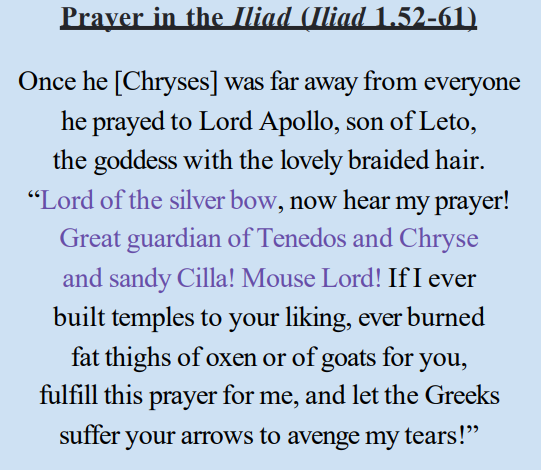
Book 1 where it describes the Greeks making a sacrifice in the name of Apollo
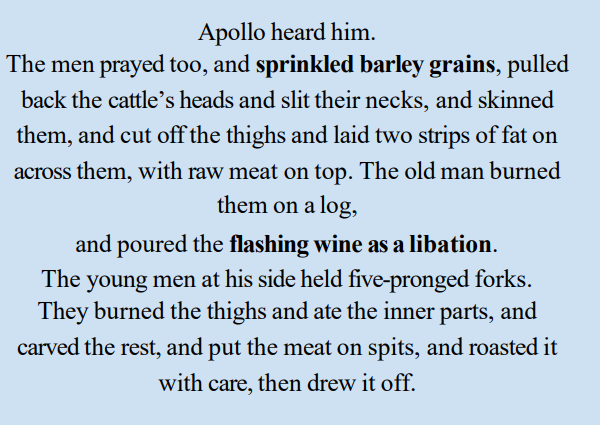
Book 1 where Thetis gets Zeus to answer Achilles’ wish
Mortal mother vs immortal son
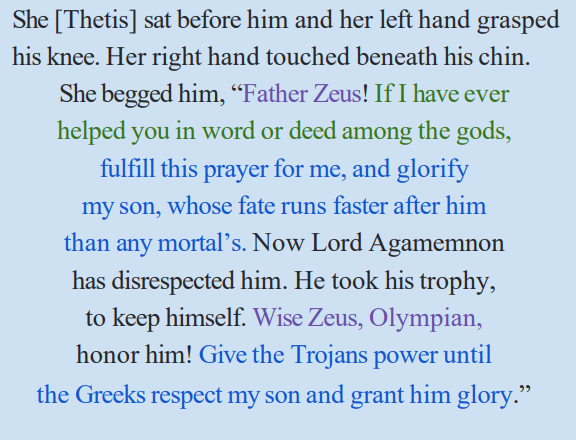
Book 1 where Zeus agrees to help Thetis
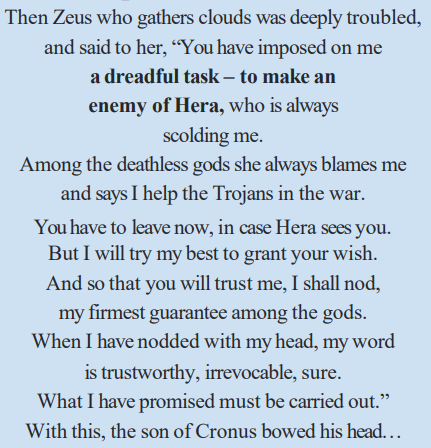
Book 3 where Helen speaks to Priam of her regrets for coming to Troy with Paris
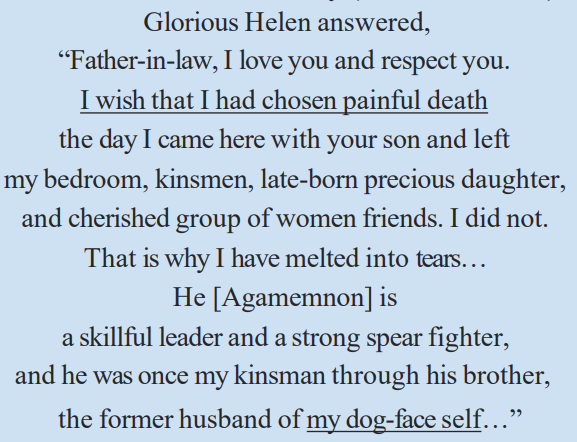
Book 3 where Menelaus prays to Zeus to be able to finish off Paris before Aphrodite saved him
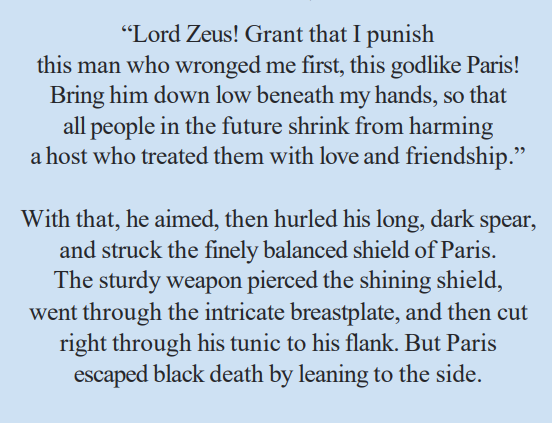
Book 4 during the council of the gods where Zeus is trying to decide what to do about the war
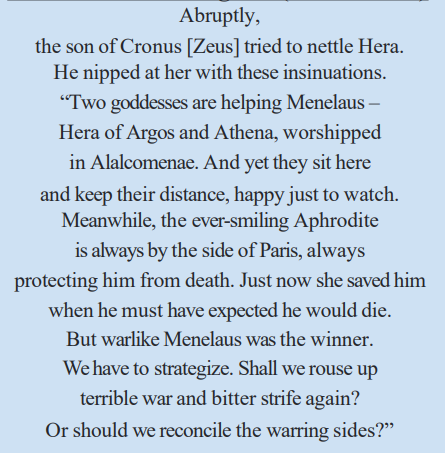
Book 4 during the council of the gods where Zeus questions Hera’s hatred for the Trojans
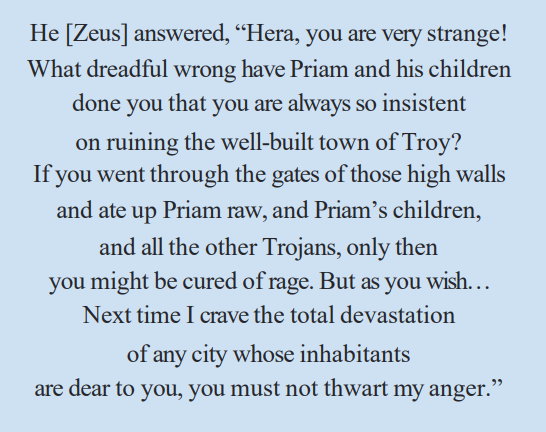
Book 4 where Zeus describes his love for Troy
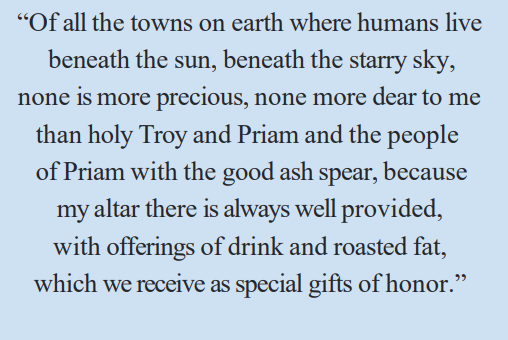
Book 5 where Diomedes prays to Athena to help him after he is wounded
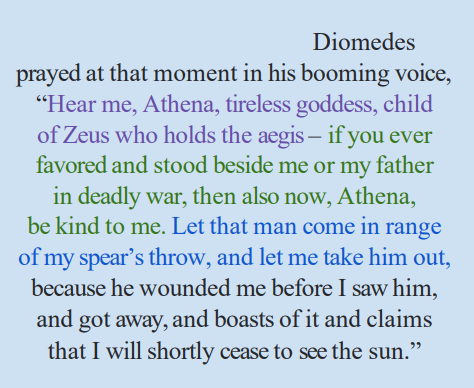
Book 5 where Athena answers Diomedes prays and gives him strength, the ability to see gods, and also tells him of Aphrodite’s weakness
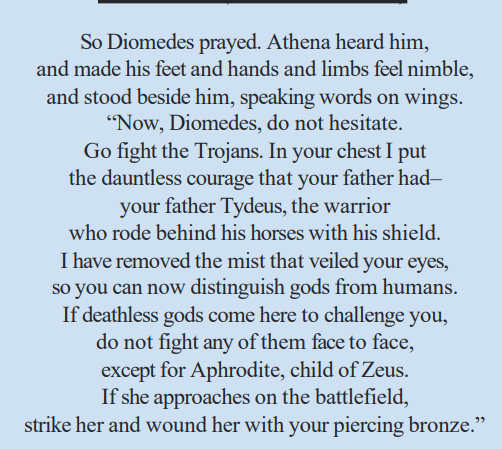
Book 5 when Diomedes pursues Aeneas just before he is saved
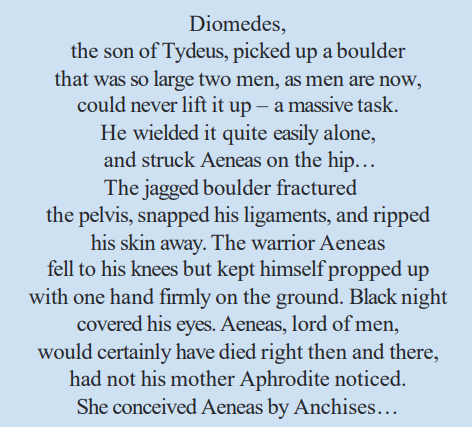
Book 5 where Diomedes uses the knowledge Athena gave him to wound Aphrodite
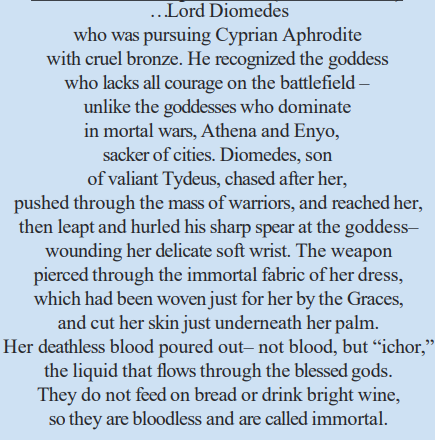
Book 6 where Agamemnon scolds Menelaus and insists they destroy the Trojan’s legacy
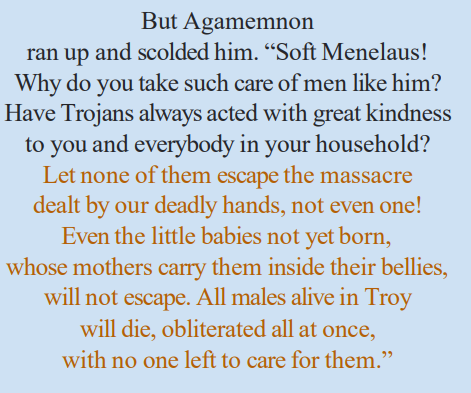
Book 6 of an interaction between Diomedes and a man named Glaucus where Diomedes recalls an ancestor hosting one of Glaucus’. They exchange armor.
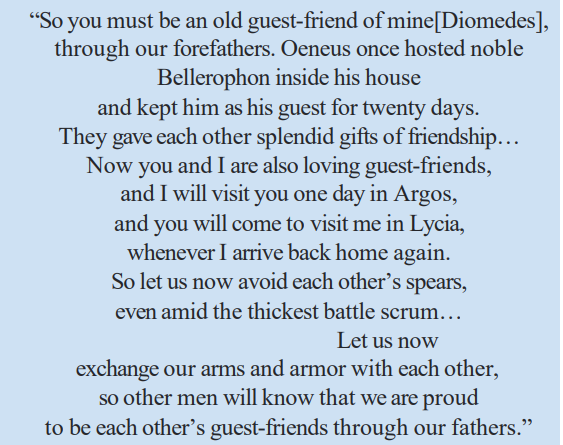
Book 6 talk between Andromache and Hector. Andromache talks about the awful fate suffered by many women during the destruction of cities and wars.
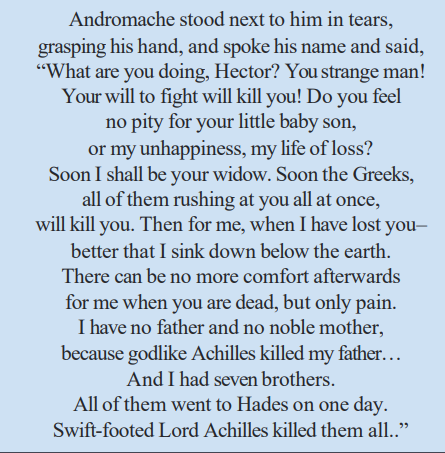
Book 6 where Hector explains why he cannot return home when he has men to lead in the war.
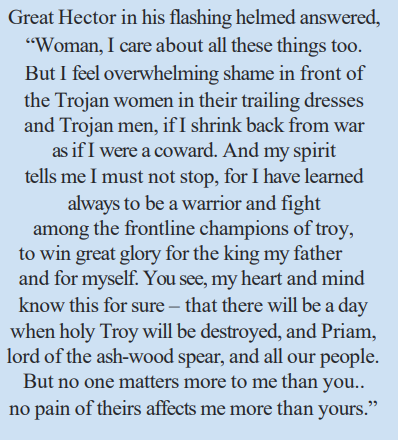
Book 7 where Nestor addresses Agamemnon of the dead
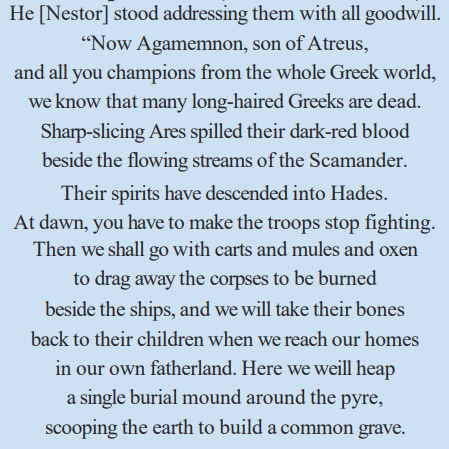
Book 7 where the Greeks burn and bury the bodies after they come to an agreement with the Trojans
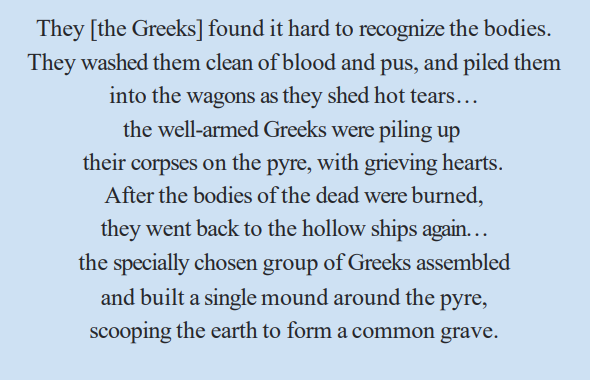
Book 3 of Helen’s description of Odysseus to Priam

Book 3 of Antenor’s description of Odysseus
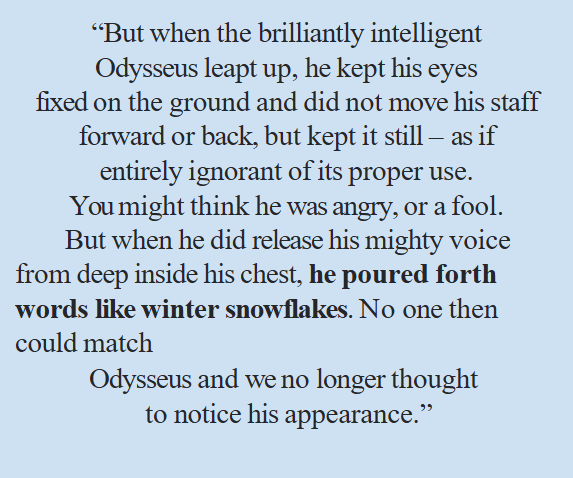
Book 9 where Agamemnon admits he was wrong
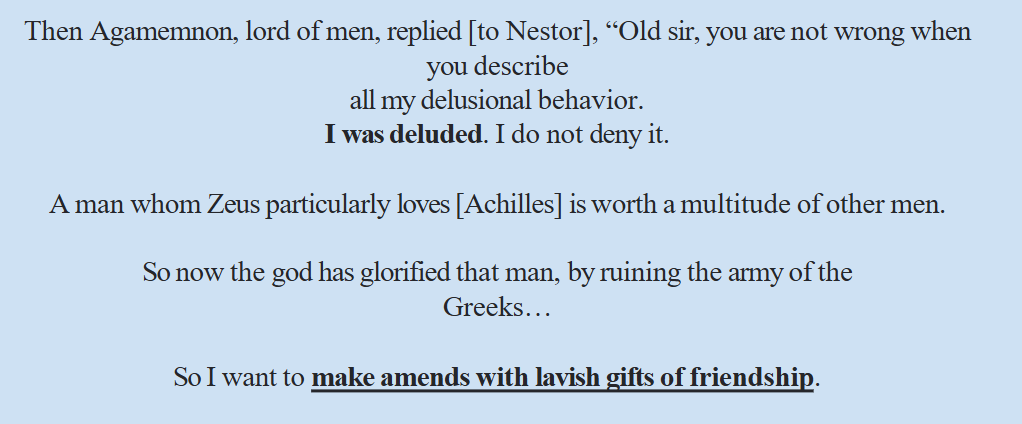
Achilles’ final answer from book 9
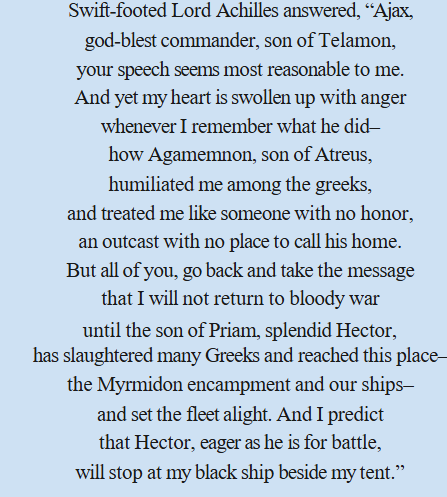
Book 6 where Hector describes Andromache’s fate
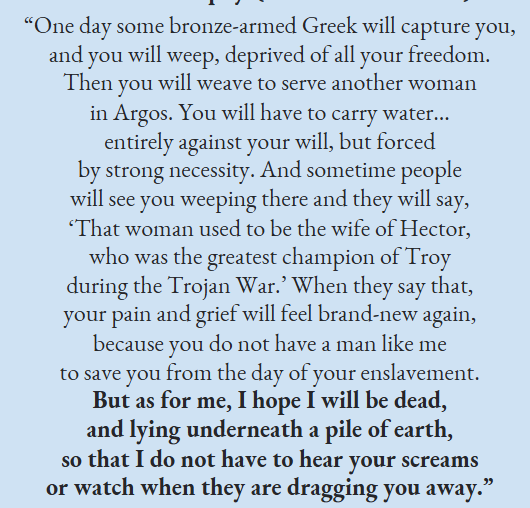
Book 11 when Paris hurts Diomedes
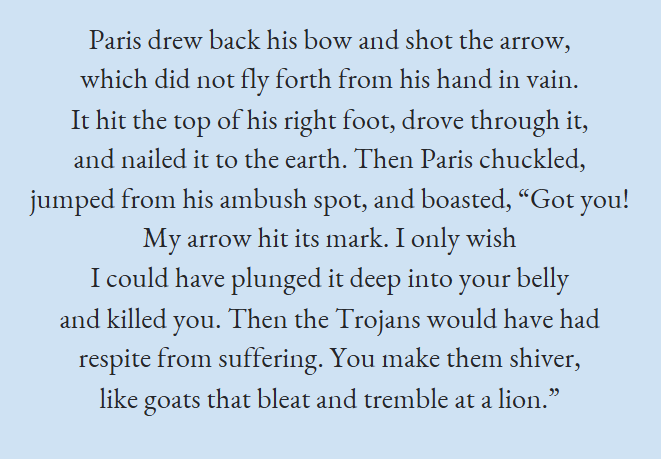
Diomedes’ response to being hurt by Paris in book 11
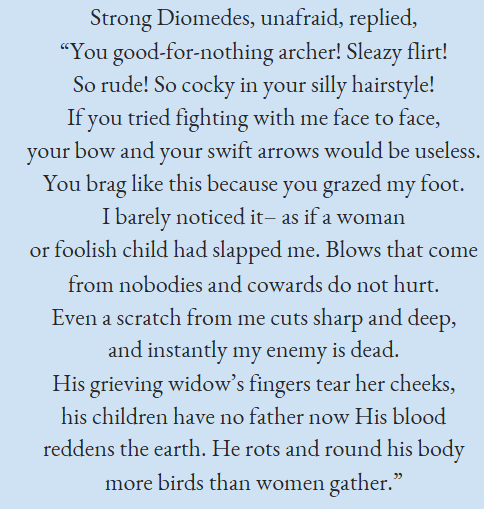
Book 13 where Zeus abandoned the Trojans at their peak and Poseidon stepped in
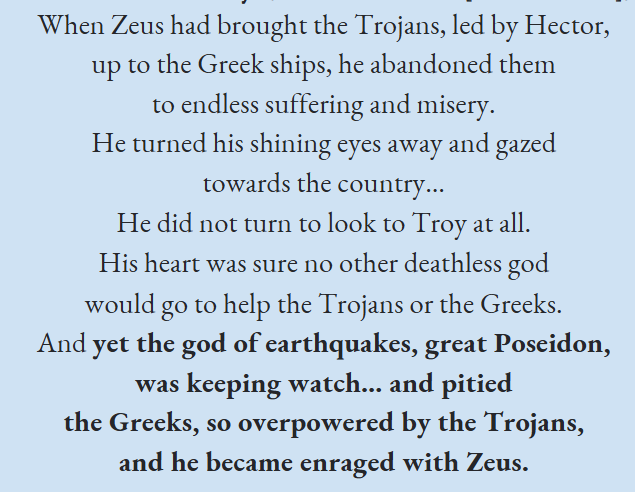
Book 13 where Poseidon inspires the Greeks
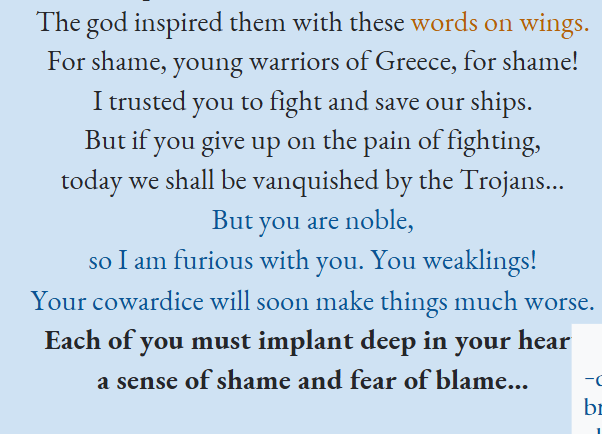
Book 16 where Patroclus shames Achilles
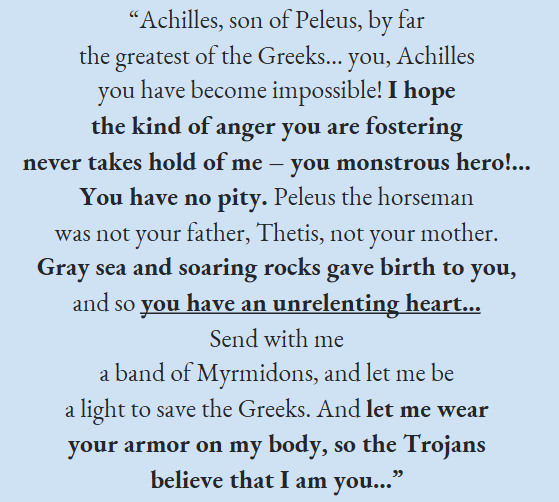
Book 16 where Zeus thinks about saving Sarpedon from death by Patroclus
If he interferes, the other gods will also start to save their children and beloveds: it would set a precedent
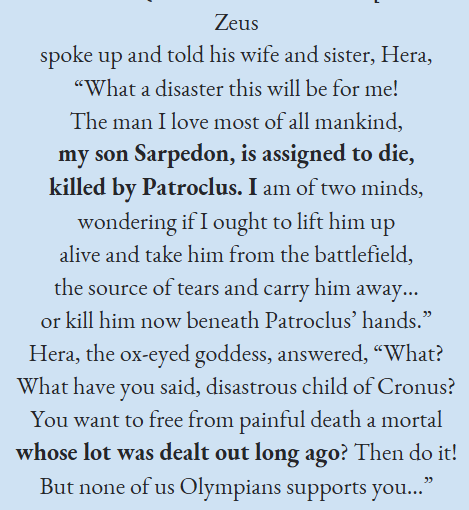
Book 16 where both sides fight over Sarpedon’s body which is eventually taken and moved by Apollo
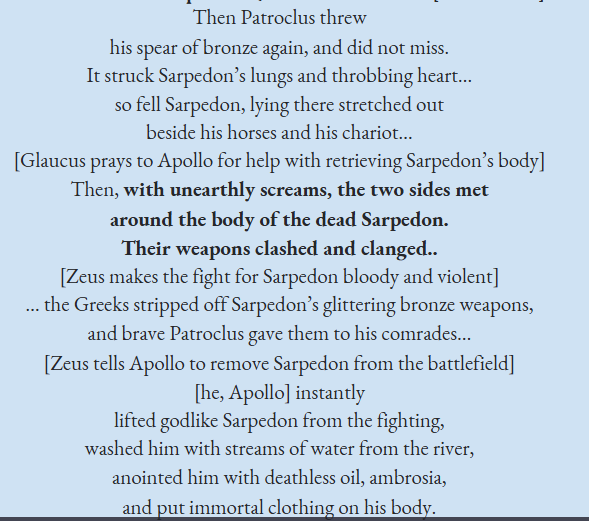
Patroclus’ final words in book 16
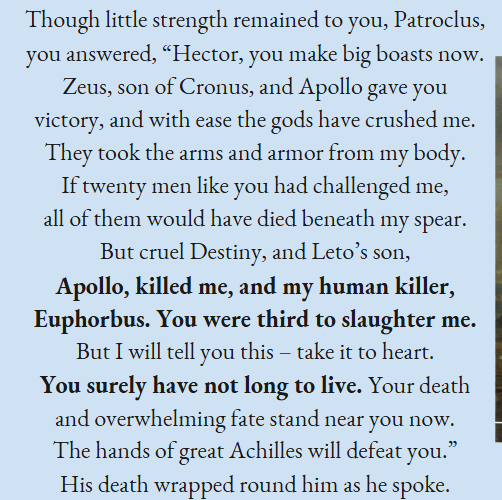
Achilles mourning Patroclus’ death in book 18
Ritual mourning involves women screaming, tearing their hair and beating their breasts
Men sometimes pour dirt on themselves to symbolize grief
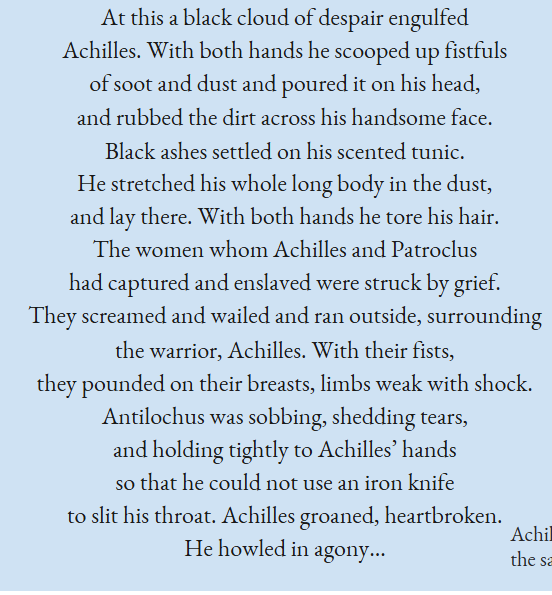
Book 16 during Patroclus’ killing spree
Compared to Ares himself
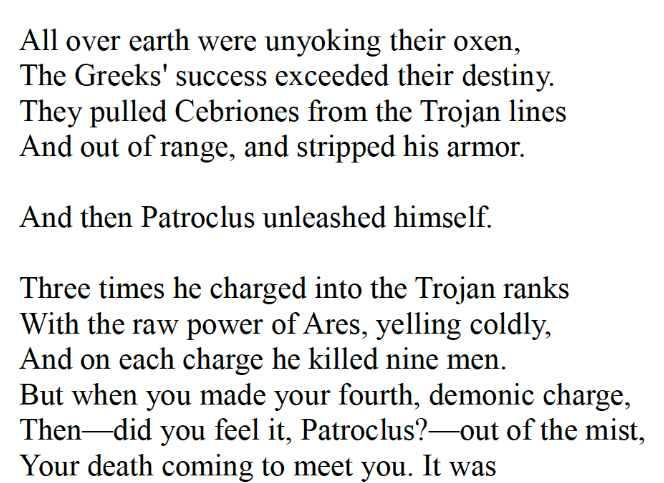
Priam speaking to Hector of “the beautiful death” during book 22
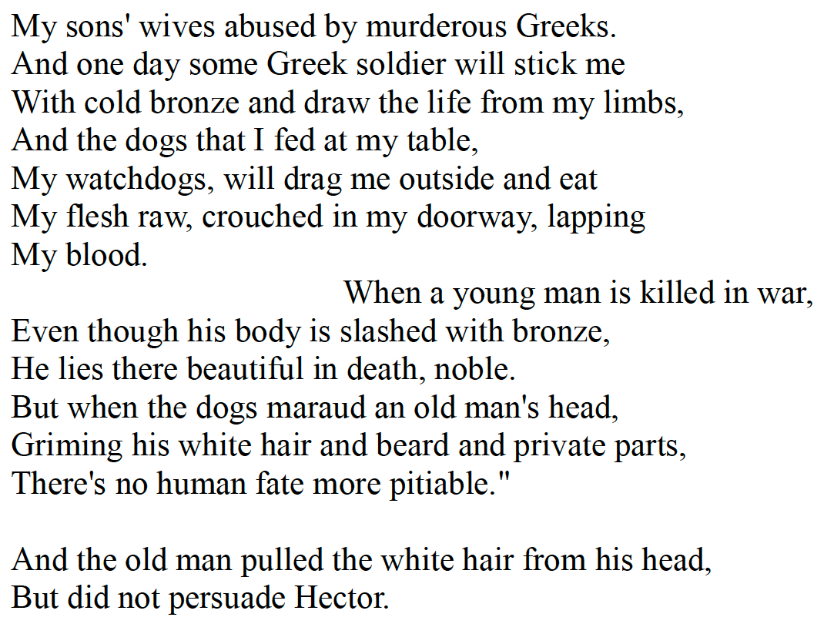
Book 1 of Herodotus where Solon discusses Greek beliefs when it comes to a beautiful death
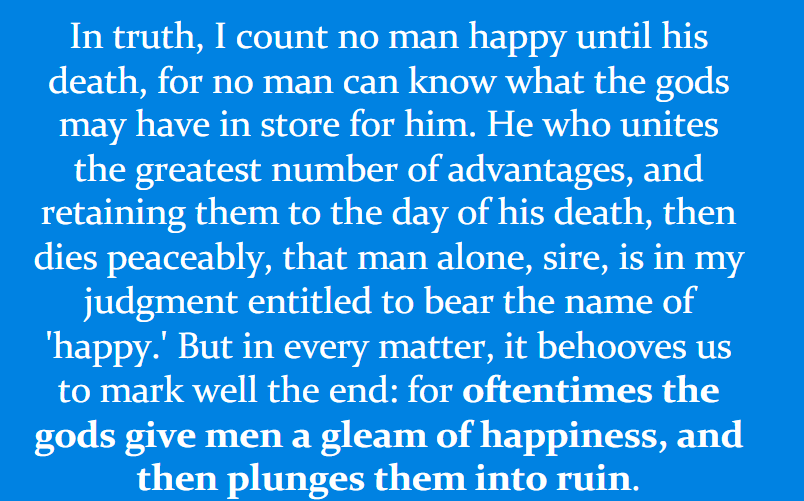
Book 3 of Herodotus where Herodotus showcases cultural differences

Book 1 Herodotus: Rise of Persia
• Croesus will be the “first harm to the Greeks”
• Candaules, Gyges, Alyattes, and Croesus are all real persons but their lives have become almost like myths or folk tales